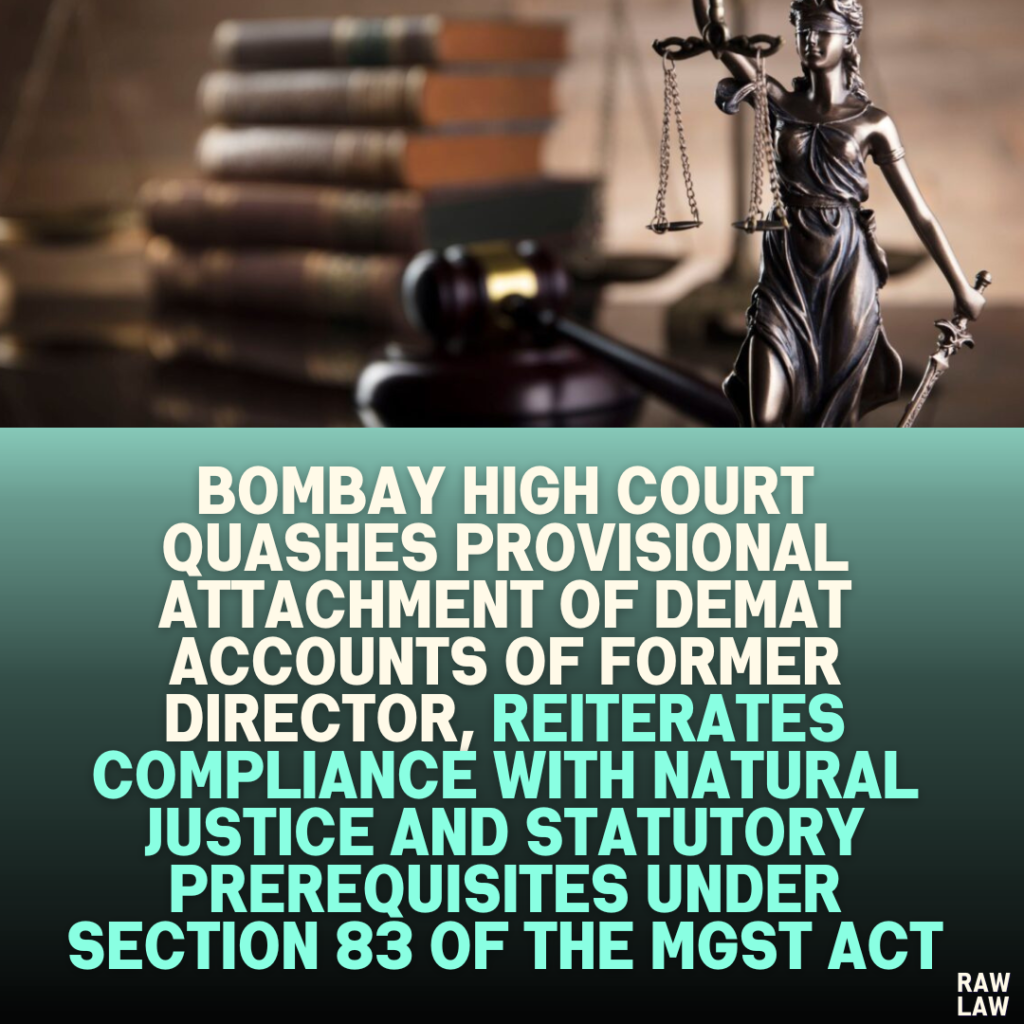Court’s Decision:
The Bombay High Court ruled in favor of the petitioner, quashing the attachment and freezing of his Demat accounts by the tax authorities under Section 83 of the Maharashtra Goods and Services Tax Act (MGST Act). The Court found that the attachment lacked legal justification because:
- There were no proceedings initiated under the requisite chapters of the MGST Act.
- The action failed to comply with the principles of natural justice. The Court directed the respondents to withdraw the attachment and ensure proper procedure in future actions.
Facts:
- The petitioner was appointed as a non-executive director of a private company, Vistaar Logistics Pvt. Ltd., on February 25, 2016. He resigned from the position on March 18, 2019, and the resignation was formally accepted by the company on March 20, 2019. The resignation was also filed with the Ministry of Corporate Affairs through Form DIR-12.
- Despite his resignation, the petitioner’s Demat accounts were attached on February 22, 2024, and June 20, 2024, by the tax authorities, citing defaults in Goods and Services Tax (GST) payments by the company.
- The petitioner challenged the attachments, arguing that he was no longer associated with the company and that the action was arbitrary and unlawful.
Issues:
- Whether the attachment of the petitioner’s Demat accounts under Section 83 of the MGST Act was legally valid.
- Whether the attachment violated the principles of natural justice by failing to provide the petitioner with notice or an opportunity to be heard.
- Whether the petitioner could be held liable for GST defaults of the company after his resignation.
Petitioner’s Arguments:
- Resignation: The petitioner claimed he had no connection with the company after his resignation in March 2019. Therefore, any liability for GST defaults incurred after his tenure as director could not be attributed to him.
- No Proceedings Under MGST Act: He pointed out that no proceedings were initiated under Chapters XII, XIV, or XV of the MGST Act, which are prerequisites for invoking Section 83.
- Violation of Natural Justice: The petitioner argued that the attachment was carried out without prior notice or an opportunity to be heard, constituting a violation of natural justice.
- Precedent: He relied on the judgment in Prasanna Karunakar Shetty vs. State of Maharashtra to assert that provisional attachment without following due process is unlawful.
Respondent’s Arguments:
- Provisional Nature of Attachment: The respondents justified the attachment as provisional under Section 83 of the MGST Act, aimed at protecting government revenue.
- Liability During Tenure: The respondents contended that the GST liability related to the petitioner’s tenure as a director of the company.
- Compliance with Section 89: They argued that a notice under Section 89 of the MGST Act would be issued to the petitioner, providing an opportunity for him to respond.
Analysis of the Law:
- Section 83 of the MGST Act: This section allows provisional attachment of property or bank accounts of a taxable person after initiating proceedings under Chapters XII (assessment), XIV (inspection, search, seizure), or XV (demands and recovery).
- The Court noted that no proceedings under these chapters were initiated against the petitioner.
- Principles of Natural Justice: The Court emphasized that even in provisional attachments, authorities must adhere to the principles of natural justice by providing notice and an opportunity to be heard.
- Application of Precedent: The judgment in Prasanna Karunakar Shetty vs. State of Maharashtra was relied upon to assert that such attachments must comply with statutory and procedural requirements.
Precedent Analysis:
- The Court referred to the case of Prasanna Karunakar Shetty, where a similar attachment was quashed due to lack of adherence to statutory provisions and natural justice. This reinforced the petitioner’s case.
Court’s Reasoning:
- No Proceedings Initiated: The Court observed that the impugned action did not arise from any proceedings under the prescribed chapters of the MGST Act. Hence, it lacked statutory backing.
- Violation of Natural Justice: The attachment was carried out without prior notice or an opportunity to be heard, rendering it procedurally flawed.
- Provisional Attachment Requirements: The Court reiterated that provisional attachment under Section 83 could only be exercised when statutory prerequisites were fulfilled, which was not the case here.
- Future Actions: The Court clarified that while the attachment was quashed, the tax authorities could issue notices under Section 89 and take action in accordance with the law.
Conclusion:
The Court granted the petitioner’s reliefs, quashing the attachment orders dated February 22, 2024, and June 20, 2024. It directed the respondents to inform the depositories to lift the attachment and allowed them to proceed under Section 89 of the MGST Act, ensuring compliance with natural justice.
Implications:
- Reaffirmation of Natural Justice: The judgment underscores the necessity of following due process in tax enforcement actions, safeguarding individual rights.
- Limits on Provisional Attachment: Authorities are reminded that Section 83 powers must be exercised strictly within the statutory framework.
- Liability of Resigned Directors: The case highlights that directors cannot be held liable for a company’s defaults post-resignation unless proven otherwise through due process.




Pingback: Bombay High Court: "Affidavit Affirmed Before a Judicial Clerk Does Not Satisfy the Requirement of an Examination Under Oath by the Magistrate" – Process Quashed for Non-Compliance with Section 200 CrPC - Raw Law